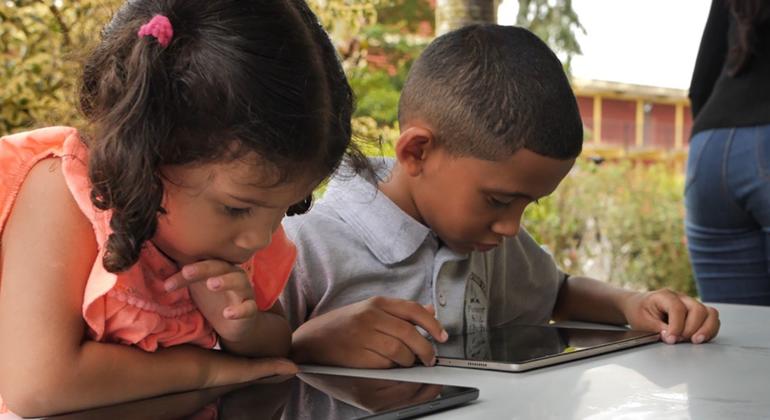When 11-year-old Venezuelan refugee Astrid Saavedra walked into her fourth-grade classroom in Trinidad and Tobago for her first day of school in September, she was eager to begin lessons in her favourite subject, mathematics. But the prospect of teaching fellow students about her homeland Venezuela was equally exciting.
Astrid is one of the first refugee and migrant children from Venezuela to be allowed to enter the Trinidadian national public education system, following a change in the country’s immigration rules.
She was part of the first cohort of 60 children to meet the admission criteria, which included possession of a certified, translated birth certificate and immunization record, and be assigned a school, marking an important milestone in fulfilling Trinidad and Tobago’s commitment to fully meeting its obligations under the Convention on the Rights of the Child, an international UN human rights treaty.
“These young people, should they stay in Trinidad and Tobago, would be adequately prepared to enter the workforce of this country, filling gaps in the labour market and contributing to innovation and sustainability,” said senior UN migration agency (IOM) official, Desery Jordan-Whiskey. “It’s also an opportunity for these children, who are mostly Spanish speaking, to contribute just as much as they would gain, by helping their peers learn a second language.”
An investment in the future
The changes in legislation that allowed children like Astrid to go to school came about in July 2023, during a meeting of UN officials and politicians, at which Trinidad’s Minister of Foreign Affairs officially announced the Government’s decision.
UN agencies agree that the right to receive an education is an example of the way human rights overlaps with sustainable development.
“Advocating for access to education is key to bridging the gap between immediate humanitarian needs and long-term development goals,” said Amanda Solano, head of the UN refugee agency (UNHCR) in Trinidad and Tobago. “By providing education to refugee and migrant children, we’re not just meeting their immediate needs, we’re investing in their future and the future of Trinidad and Tobago.”
Over 2,000 refugee and migrant children remain excluded from the school system. The UN has made efforts to provide them with alternative learning opportunities, or to place them in private schools but has expressed a preference for wider admission to the state school system.
A committee of UN agencies and partners, the Education Working Group (EWG), is working with the Government of Trinidad and Tobago to better understand the training and logistical support that would be required to accommodate larger numbers of refugee and migrant children into local schools.
The hope is to create a more inclusive and welcoming environment for all children, regardless of their background or nationality. Education is a fundamental human right, and every child deserves the opportunity to learn and grow.
The influx of Venezuelan refugees and migrants into Trinidad and Tobago has presented challenges for the government and local communities. The sudden increase in population has strained resources and infrastructure, leading to concerns about social cohesion and integration.
However, education has the power to bridge divides and foster understanding among diverse groups. By allowing refugee and migrant children to attend school alongside their Trinidadian peers, the government is sending a message of inclusion and solidarity.
Astrid’s presence in the classroom is a reminder of the resilience and determination of refugee children. Despite facing unimaginable hardships and displacement, they continue to pursue their dreams and aspirations. Education is a lifeline for these children, offering them hope for a brighter future.
As Astrid settles into her new school and makes friends with her classmates, she is also sharing her culture and experiences with them. Through storytelling and sharing traditions, she is breaking down stereotypes and building connections with her peers.
The school environment is a place where children from different backgrounds can come together, learn from each other, and celebrate diversity. It is a microcosm of society, reflecting the values of tolerance, empathy, and respect for all individuals.
Trinidad and Tobago’s decision to open its doors to refugee and migrant children is a testament to the country’s commitment to human rights and social justice. By providing access to education for all children, regardless of their nationality or status, the government is upholding its obligations under international law and setting an example for other nations to follow.
The road ahead may be challenging, as the government works to integrate refugee and migrant children into the school system and address the needs of a diverse student population. But the benefits of inclusive education far outweigh the challenges, as it promotes social cohesion, economic development, and mutual understanding among all members of society.
In the words of UNHCR Trinidad and Tobago, “By investing in the education of refugee and migrant children, we are investing in the future of our nation. Every child deserves the opportunity to learn, grow, and thrive, regardless of their background or circumstances. Together, we can build a more inclusive and welcoming society for all.”









